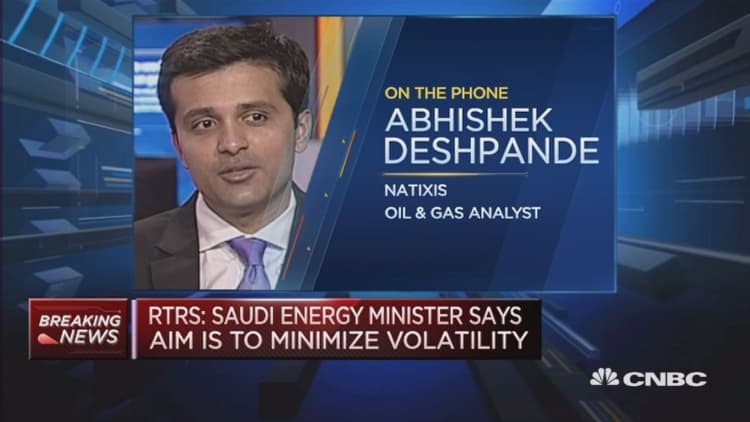
Energy experts poured scorn on the prospect of Russia and Saudi Arabia collaborating to stabilize the oil market, after the two countries made a joint statement to that effect on Monday.
The two major oil producers announced at the G-20 summit in China that they would form a group to monitor the market and make recommendations on stabilizing prices, according to media reports. Russian Energy Minister Alexander Novak described the moment as "historic" and touted the possibility of the much-discussed-but-never-delivered crude production freeze.
Commodity strategists told CNBC that the statement might push crude prices higher in the short-term, perhaps toward $50 per barrel, but insisted that little in the way of deeper cooperation was likely.
"The running gag of the 'freeze' means just nothing," Eugen Weinberg, head of commodity research at Commerzbank, told CNBC on Monday.
"As to the cooperation between Russia and Saudi Arabia — no chance! It's clearly just lip service since real cooperation between these competitors is just impossible," he later added.
Crude oil futures rallied sharply in the build-up to the announcement, before paring some gains once it was out. Light crude futures for October traded over 2 percent higher at around $45.40 per barrel after the news, with volumes lower than usual because of the U.S. Labor Day holiday.
WTI crude futures for October have rallied sharply this year, but remain far below the levels above $100 per barrel at which oil traded prior to the commodities slump that began in July 2014.
"The press conference came and went without any significant initiatives being announced. Once again it highlights key producers' ability to talk up the market without backing it by action," Ole Hansen, head of commodities strategy at SaxoBank, told CNBC on Monday.
"I expect the market to drift lower as this was an exercise in building up expectations without delivering anything," he added.
Gimmicks
With Saudi production at high levels and Russia lacking the means to cut output, it is debatable how much a freeze would achieve, even if agreed.
Fereidun Fesharaki, founder of energy consultancy, FACTS Global Energy, described Monday's announcements as "gimmicks" designed to boost prices for a few days or weeks.
"Fundamentals do not change at all with the freeze. Saudis have upped their production to 10.7 million barrels per day so immediate surge capacity for them is not more than 200,000 to 300,000 barrels per day. They max production then they talk freeze and markets are so stupid they take this as positive," he told CNBC on Monday.
Even if Saudi Arabia and non-OPEC member Russia agreed to a freeze, there would still be the thorny matter of gaining the cooperation of other OPEC countries. Several attempts have failed in the past, in particular because Saudi Arabia has been wedded to keeping output high to hold market share. However, Saudi Arabia is not alone in scuppering deals, with Iran refusing to join forces with Saudi Arabia, Russia, Qatar and Venezuela in freezing output in February.
Energy commodity prices
Energy Futures
"Saudi (Arabia) might have seen that it would be very difficult to get a freeze/cut agreement accepted within OPEC. Iran would not accept such an agreement and Saudi (Arabia) would not like to cut or freeze alone," Thina Margrethe Saltvedt, a senior analyst at Nordea, told CNBC on Monday.
"Maybe Saudi (Arabia) finds it easier to cooperate with Russia to get an agreement that actually has an effect on the market. A small cut from UAE (United Arab Emirates) or Qatar would not help and member countries like Venezuela and Nigeria would not cut as they are facing deep economic and political problems. So — Russia and Saudi could agree on a freeze agreement at today's level, but I doubt it would have a major impact on the market," she said.
Follow CNBC International on Twitter and Facebook.


